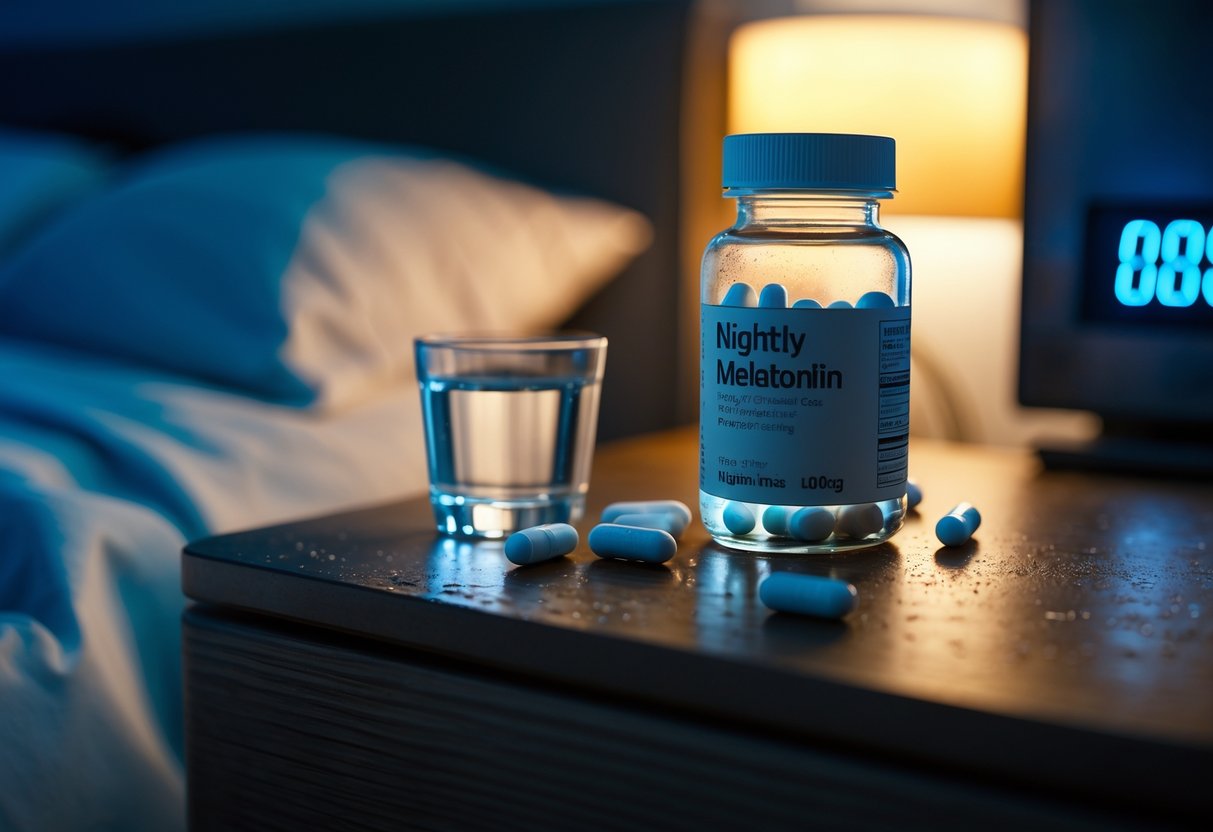Millions of people reach for melatonin supplements each night, hoping for better sleep. But what actually happens to your body when you make this a daily habit?

Taking melatonin every night is generally safe for short-term use[1], but the long-term effects remain unclear and may include decreased effectiveness over time. Your body naturally produces this hormone to regulate sleep cycles, but supplementing it nightly can create changes that extend beyond just falling asleep faster.
The effects of daily melatonin use vary from person to person. While some experience improved sleep quality and easier bedtime routines, others may face side effects like headaches, dizziness, and nausea[2]. Understanding what happens when you take melatonin every night helps you make informed decisions about your sleep health.
Key Takeaways
- Melatonin is safe for nightly use in the short term but may lose effectiveness with extended daily use
- Common side effects include headaches, dizziness, and potential interference with natural hormone production
- People with certain health conditions or taking specific medications should consult a doctor before daily melatonin use
How Melatonin Works in the Body

The body naturally makes melatonin in response to darkness, which signals it’s time to sleep. When people take melatonin supplements, they add synthetic hormones to boost their natural levels and potentially improve sleep timing.
Natural Melatonin Production and Circadian Rhythm
The brain makes natural melatonin in the pineal gland[3], a small structure deep inside the head. This process happens automatically when darkness falls.
Light exposure directly affects melatonin production. When the eyes detect light, they send signals to the brain that stop melatonin release. Being exposed to light at night can block melatonin production[4].
The circadian rhythm controls this daily cycle. This internal clock runs on roughly a 24-hour schedule and responds to environmental cues like light and darkness.
Key factors that influence natural melatonin:
- Light exposure – Bright lights suppress production
- Age – Production decreases as people get older
- Screen time – Blue light from devices can interfere
- Sleep schedule – Irregular bedtimes disrupt the cycle
Melatonin levels typically start rising around 9 PM in healthy adults. They peak between 2-4 AM, then drop sharply in the morning hours.
Role of Melatonin in Regulating Sleep-Wake Cycles
Melatonin acts as the body’s natural sleep signal. The production of melatonin increases in response to darkness, prompting the feeling of sleepiness[1].
The hormone doesn’t force sleep like a sedative. Instead, it tells the body that nighttime has arrived and prepares various systems for rest.
Sleep-wake regulation process:
- Eyes detect decreasing light
- Brain releases melatonin
- Body temperature drops slightly
- Heart rate and blood pressure decrease
- Drowsiness increases
When a person is exposed to light, melatonin production decreases, prompting the feeling of wakefulness[1]. This creates the natural wake-up process in the morning.
The timing of melatonin release helps maintain consistent sleep patterns. People who travel across time zones or work night shifts often struggle because their melatonin production doesn’t match their desired sleep schedule.
Synthetic Melatonin and Supplementation
Melatonin dietary supplements can be made from animals or microorganisms, but most often they’re made synthetically[4]. Labs create these supplements to match the molecular structure of natural melatonin.
Synthetic melatonin works similarly to the body’s own hormone. When people take it as a dietary supplement, it binds to the same receptors in the brain that natural melatonin uses.
Common supplement forms:
- Pills and tablets
- Liquid drops
- Gummies
- Sublingual tablets
- Patches
The supplement enters the bloodstream and reaches the brain within 30-60 minutes. Taking melatonin supplements can help increase the amount of this hormone in the body[5].
Unlike natural melatonin that releases gradually, supplements create a more immediate spike in levels. This can help people who need to shift their sleep timing or those whose natural production has decreased.
The effectiveness depends on timing and dosage. Most experts recommend taking melatonin 1-2 hours before the desired bedtime for best results.
Expected Effects of Taking Melatonin Every Night

Taking melatonin every night can help people fall asleep faster and may improve sleep quality for certain conditions. The supplement works best for specific sleep disorders but has mixed results for general insomnia.
Impact on Falling Asleep and Staying Asleep
Melatonin supplements help people fall asleep faster when taken 1-2 hours before bedtime. Lower doses between 0.3 and 0.5 milligrams are more effective[6] than higher doses for shifting sleep patterns.
The sleep aid works by mimicking the body’s natural hormone that signals bedtime. When darkness occurs, melatonin production increases naturally to promote sleepiness.
Effects on sleep timing include:
- Faster sleep onset (usually within 30-60 minutes)
- Better alignment with natural sleep cycles
- Reduced time spent lying awake in bed
Melatonin has less clear effects on staying asleep throughout the night. Most research shows it primarily helps with the initial process of falling asleep rather than preventing nighttime awakenings.
People who take melatonin every night may notice these effects become less strong over time. This happens because the body can become less responsive to the supplement with regular use.
Benefits for Sleep Disorders and Insomnia
Melatonin works better for certain sleep disorders than others. It may be useful for short-term insomnia, specifically insomnia that involves trouble falling asleep[1], with doses ranging from 1 to 5 mg.
Most effective for:
- Jet lag (especially eastward travel)
- Delayed sleep phase disorder
- Shift work sleep problems
- Short-term sleep difficulties
The supplement shows strong results for jet lag treatment. When traveling eastward, experts suggest taking 3 mg melatonin[1] for up to five days after arrival.
Shift workers may benefit from evening melatonin use when adjusting to new schedules. However, the research on this use remains somewhat limited.
For chronic insomnia that lasts three months or longer, melatonin shows less clear benefits. Current evidence does not show melatonin is effective for chronic insomnia[1] treatment.
Changes in Sleep Quality and Duration
People taking melatonin every night may experience better sleep quality in the short term. The supplement helps align sleep patterns with natural body rhythms.
Common quality improvements include:
- More restful sleep during the first few hours
- Better sleep consistency night to night
- Reduced anxiety about falling asleep
Sleep duration changes vary from person to person. Some people sleep longer when taking melatonin, while others maintain the same sleep length but feel more rested.
The supplement works best when combined with good sleep habits. This includes keeping a dark, cool bedroom and maintaining regular bedtime schedules.
Long-term effects on sleep quality remain unclear. Research on melatonin’s long-term effects is limited[1], and the supplement may become less effective with nightly use.
Children and teenagers may see different results than adults. Melatonin is tolerated in doses up to 3 mg in children and up to 5 mg in adolescents[1], but should only be used under medical supervision.
Risks and Potential Side Effects of Nightly Melatonin Use

Taking melatonin every night can cause both immediate and delayed reactions in the body. Common melatonin side effects[7] range from mild drowsiness to more serious interactions with prescription medications.
Common Short-Term Side Effects
The most frequent side effects of melatonin appear within hours or days of use. Daytime drowsiness occurs especially with higher doses[8] above 10 milligrams.
Most Common Reactions:
- Headache
- Dizziness
- Nausea
- Next-day grogginess
Some people experience vivid dreams or nightmares during the first few weeks of use. These sleep disturbances usually fade as the body adjusts to the supplement.
Mood changes can also occur with nightly use. Users report feeling more irritable or experiencing mild depression symptoms.
Taking melatonin too close to bedtime increases the risk of morning drowsiness. Sleep medicine experts recommend taking it 2-3 hours before intended sleep time.
Possible Long-Term Side Effects
Scientists have limited data on what happens when people take melatonin every night for months or years. Research shows uncertainty about long-term safety[9] of continuous use.
Extended use may disrupt the body’s natural melatonin production. The pineal gland might reduce its own hormone output when receiving regular supplements.
Regular use can affect sleep cycles and hormonal balance[10] over time. This creates potential dependency on the dietary supplement for sleep.
Some studies suggest melatonin might interfere with reproductive hormones in younger adults. However, more research is needed to confirm these effects.
Long-term users sometimes report tolerance, requiring higher doses to achieve the same sleep benefits.
Interactions With Medications and Other Supplements
Melatonin can interact dangerously with several types of prescription drugs. The supplement affects medicines that slow blood clotting[11] and other critical medications.
High-Risk Drug Interactions:
- Blood thinners (warfarin, aspirin)
- Seizure medications
- Blood pressure medications
- Diabetes medications
- Birth control pills
People taking immunosuppressive drugs should avoid melatonin. The hormone can boost immune system activity and interfere with transplant medications.
Combining melatonin with alcohol increases drowsiness and impairs motor skills. This combination also reduces the supplement’s effectiveness for sleep.
Other sleep aids and sedatives create additive effects when mixed with melatonin. Users may experience excessive sedation or breathing problems.
Who Should and Should Not Take Melatonin Regularly

Melatonin supplements work best for specific groups with certain sleep disorders, while others face serious health risks. Age, medical conditions, and medications all play key roles in determining safety.
Appropriate Use for Different Age Groups
Adults with jet lag or shift work disorders benefit most from regular melatonin use. Short-term melatonin use is safe for most adults[1] who need help adjusting their sleep cycles.
People traveling eastward can take melatonin for up to five days. Night shift workers may use it during schedule changes with doctor approval.
Children and teens need medical supervision before taking melatonin supplements. Dosages up to 3 mg work for children and up to 5 mg for teens[1] with diagnosed sleep disorders.
Healthy children without sleep problems should not take melatonin. Parents must store supplements safely away from children.
Older adults often have lower natural melatonin production. They may benefit from low-dose supplements but need careful monitoring for drug interactions.
Groups at Higher Risk and Contraindications
Several groups should avoid regular melatonin use due to serious health risks. People trying to conceive should avoid melatonin[1] as it may affect fertility in both men and women.
Pregnant and breastfeeding women lack safety research for melatonin supplements. Medical experts recommend avoiding melatonin during these periods.
People with these conditions face increased risks:
- Bleeding disorders – Melatonin slows blood clotting
- Epilepsy – May trigger more seizures
- Autoimmune diseases – Can worsen symptoms
Medication interactions occur with:
- Blood thinners
- Epilepsy medications
- Birth control pills
- Diabetes drugs
- Blood pressure medications
Anyone taking these medications needs doctor approval before using melatonin supplements.
Best Practices for Safe and Effective Use

Taking melatonin supplements correctly involves using the right dose at the proper time, selecting high-quality products, and getting medical guidance when needed. Short-term melatonin use is typically safe[1] for most adults when these practices are followed.
Recommended Dosages and Timing
Lower doses work better than high doses. Sleep medicine experts recommend starting with 0.3 to 0.5 milligrams for most people. This amount often works more effectively than larger doses.
Adults typically need 1 to 5 mg for insomnia[1], while children should not exceed 3 mg. Teens can take up to 5 mg when medically necessary.
Timing matters as much as dosage. People should take melatonin 1-2 hours before their desired bedtime. This matches when the body naturally increases melatonin production.
For jet lag, travelers need 3 mg taken in the evening at their destination. They can continue this for up to five days[1] when traveling eastward or crossing more than twelve time zones westward.
Start with the smallest effective dose. Healthcare providers can increase the amount gradually if needed. Taking too much can cause next-day drowsiness and reduce effectiveness.
Choosing Quality Melatonin Supplements
The FDA does not regulate melatonin as a prescription drug. Melatonin falls under dietary supplement rules[1], which means dosages and label accuracy can vary between brands.
Look for supplements with third-party testing certificates. These products undergo independent lab testing to verify their contents and purity.
Check the ingredient list carefully. Some melatonin products contain additional herbs, vitamins, or other sleep aids. These extra ingredients may interact with medications or cause unwanted effects.
Choose products that clearly state the exact melatonin amount per serving. Avoid supplements that use unclear terms like “melatonin complex” or “proprietary blend.”
Consider the delivery method. Melatonin comes in pills, patches, liquids, and gummies. Pills typically provide more consistent dosing than other forms.
Store all melatonin supplements safely away from children and pets. Keep them in their original containers in cool, dry places.
Consulting Healthcare Professionals
Medical guidance becomes essential for certain groups. Pregnant women, nursing mothers, and people trying to conceive should avoid melatonin supplements due to limited safety research.
People with specific health conditions need medical approval first. Those with bleeding disorders, epilepsy, or autoimmune diseases[1] should not take melatonin without doctor supervision.
Medication interactions require professional review. Melatonin can interfere with blood thinners, seizure medications, birth control pills, and diabetes drugs. Healthcare providers can check for these interactions.
Children should only take melatonin when medically necessary[1] and under professional guidance. Parents should never give melatonin to healthy children without sleep disorders.
Long-term use needs medical monitoring. While short-term melatonin use appears safe, doctors can evaluate whether continued use remains appropriate and effective for each person’s situation.
Sleep medicine specialists can also suggest alternative treatments when melatonin stops working or causes side effects.
Special Considerations and Situational Uses

Melatonin works differently for specific sleep disruptions like jet lag and shift work compared to regular insomnia. Understanding how it compares to other sleep aids helps people make informed choices about their sleep health.
Melatonin for Jet Lag and Shift Work
Melatonin shows strong effectiveness for jet lag, especially when traveling eastward. Taking melatonin for jet lag[1] requires specific timing based on the destination’s time zone.
Jet Lag Dosing Guidelines:
- Eastward travel: 3 mg taken in the evening at destination
- Long-distance travel: Continue for up to 5 days after arrival
- Westward travel: Only needed when crossing more than 12 time zones
The key is taking melatonin at the right time in the new location. This helps reset the body’s internal clock faster than letting it adjust naturally.
Shift workers face different challenges with sleep timing. Melatonin may help shift workers[1] readjust their sleep schedules after changes.
Current research shows mixed results for shift work. The evidence is not as strong as it is for jet lag. Workers should talk with their doctors and employers about sleep solutions.
Comparing Melatonin to Other Sleep Aids
Melatonin differs from other sleep aids in how it works and its side effects. Most over-the-counter sleep aids contain antihistamines, which work differently than melatonin.
Key Differences:
- Melatonin: Works with natural sleep hormones
- Antihistamines: Block histamine to cause drowsiness
- Prescription drugs: Target specific brain receptors
Over-the-counter sleep aids[1] often build tolerance over time. This means people need higher doses to get the same effects.
Prescription sleep medications carry higher risks. They can become habit-forming and cause withdrawal symptoms. These drugs include benzodiazepines and Z-drugs.
Melatonin generally has fewer side effects than other options. It does not typically cause morning grogginess or dependency issues. However, it may not work as quickly as stronger medications for severe sleep problems.
Frequently Asked Questions

Many people have concerns about nightly melatonin use and its long-term effects on health and sleep patterns. Research shows mixed results on safety, dependency risks, and optimal dosing for extended use.
Can long-term use of melatonin lead to any adverse effects?
Long-term melatonin use may cause several adverse effects. Research on long-term effects remains limited[1], making it difficult to determine all potential risks.
Some experts suggest that melatonin might disrupt hormonal processes. These could include effects on puberty and menstrual cycles since melatonin is a hormone itself.
Extended use may also reduce the body’s natural melatonin production. This happens when the body becomes dependent on external supplements rather than producing its own hormone.
People with certain health conditions face higher risks. Those with bleeding disorders, epilepsy, or autoimmune diseases should avoid long-term melatonin use completely.
What is the maximum safe dosage of melatonin for chronic use?
No universal consensus exists on maximum safe dosages for chronic melatonin use. Healthcare providers typically make dosage recommendations based on individual needs[1] and specific sleep problems.
Most experts recommend starting with the lowest effective dose. For adults, this usually ranges from 0.5 to 5 milligrams per night.
Lower doses between 0.3 and 0.5 milligrams often work more effectively than higher doses[6]. Higher doses do not necessarily provide better sleep benefits.
Children require much lower doses. Safe dosages typically range up to 3 milligrams for children and 5 milligrams for teenagers.
Are there any known risks associated with taking melatonin nightly for an extended period?
Several risks exist with extended nightly melatonin use. The most significant concern involves potential hormonal disruption throughout the body.
Melatonin may affect fertility in both men and women[1]. People trying to conceive should avoid regular melatonin supplementation.
Drug interactions present another major risk. Melatonin can interfere with blood thinners, epilepsy medications, birth control, and diabetes medications.
The supplement industry lacks FDA regulation for melatonin products. This means dosages and quality vary significantly between different brands and products.
What are the potential side effects of daily melatonin consumption?
Daily melatonin use can cause several mild side effects. Common symptoms include headaches, dizziness, nausea, and daytime sleepiness[1].
Some people experience stomach upset or digestive issues. These effects usually remain mild when taking recommended doses.
Daytime drowsiness becomes problematic for many users. This can affect work performance, driving ability, and daily activities.
More serious side effects may occur in sensitive individuals. These can include mood changes, vivid dreams, or increased anxiety levels.
How does continuous nightly melatonin use impact sleep quality over time?
Continuous melatonin use may lead to decreased effectiveness over time. The body can develop tolerance, requiring higher doses to achieve the same sleep benefits.
Natural melatonin production may decline with regular supplementation. This creates a cycle where the body produces less of its own sleep hormone.
Some people experience improved sleep initially but find benefits fade after weeks or months. This pattern suggests the body adapts to external melatonin sources.
Sleep architecture may change with long-term use. However, research remains limited on how melatonin affects different sleep stages over extended periods.
Could habitual use of melatonin result in dependency or reduced efficacy?
The risk of developing dependency on melatonin remains unclear[1] due to limited long-term research. However, psychological dependence can develop even without physical addiction.
Many users report difficulty sleeping without melatonin after regular use. This suggests some form of dependency, whether physical or psychological.
Reduced efficacy commonly occurs with continued use. People often need to increase doses gradually to maintain the same sleep benefits.
Unlike prescription sleep medications, melatonin does not typically cause severe withdrawal symptoms. However, sleep problems may return or worsen when stopping after long-term use.
References
- Is It Safe to Take Melatonin Every Night?. https://www.sleepfoundation.org/melatonin/is-it-safe-to-take-melatonin-every-night Accessed November 9, 2025
- side effects like headaches, dizziness, and nausea. https://www.health.com/condition/sleep/is-it-safe-to-take-melatonin-every-night Accessed November 9, 2025
- Melatonin: What It Is, What It Does & How It Works. https://my.clevelandclinic.org/health/articles/23411-melatonin Accessed November 9, 2025
- Melatonin: What You Need To Know . https://www.nccih.nih.gov/health/melatonin-what-you-need-to-know Accessed November 9, 2025
- Taking melatonin supplements can help increase the amount of this hormone in the body. https://www.verywellhealth.com/how-does-melatonin-work-11702694 Accessed November 9, 2025
- Just a moment.... https://medicine.umich.edu/dept/psychiatry/news/archive/202307/what-happens-your-body-if-you-take-melatonin-every-night-according-behavioral-sleep-medicine-expert Accessed November 9, 2025
- Melatonin side effects: What are the risks?. https://www.mayoclinic.org/healthy-lifestyle/adult-health/expert-answers/melatonin-side-effects/faq-20057874 Accessed November 9, 2025
- Daytime drowsiness occurs especially with higher doses. https://www.verywellhealth.com/side-effects-of-melatonin-11741045 Accessed November 9, 2025
- Is It Bad To Take Melatonin Nightly? Why You Should Be Careful. https://www.mindbodygreen.com/articles/is-it-bad-to-take-melatonin-every-night Accessed November 9, 2025
- Taking Melatonin Every Night: Weighing the Risks and Benefits. https://insightmed.uk/taking-melatonin-every-night-weighing-the-risks-and-benefits/ Accessed November 9, 2025
- Should You Take Melatonin Every Night — Is It Safe? . https://www.everydayhealth.com/hormones-metabolic-disorders/should-you-take-melatonin-every-night/ Accessed November 9, 2025
